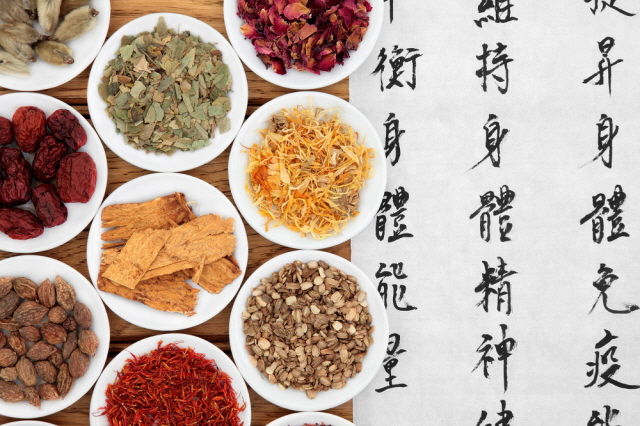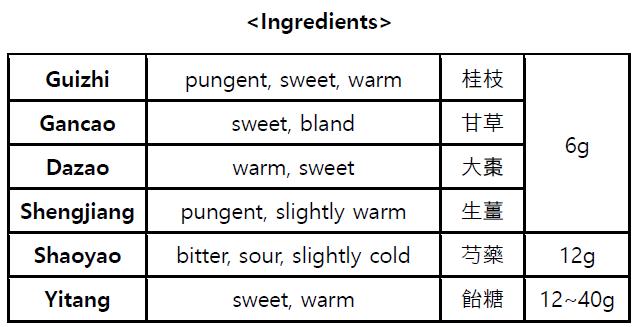
A Formula for Cold Damage and Digestive Weakness
By Ju Bong Kang, KMD
 Acts and Diagnosis
Acts and Diagnosis
Xiao-Jianzhong-Tang, from Shang Han Lun and Jin Gui Yao Lue, is an enhanced version of Guizhi-Tang that doubles Shaoyao and adds Yitang. It treats Tai-yin disease (cold damage) and consumptive diseases caused by overwork, stress, or poor lifestyle, focusing on balancing Ying-Qi and Wei-Qi.
The formula addresses weakened digestion and reduced nutrition caused by external wind-cold and internal qi-blood imbalance. Guizhi promotes yang and expels cold, while Shaoyao redirects qi and blood to the digestive organs, enhancing food and digestion. Together, they harmonize Ying and Wei. Yitang, the primary ingredient, tonifies the middle energizer, alleviates abdominal pain, and restores the spleen and stomach.
Alternative prescriptions like Renshen-Yangying-Tang or Shuanghe-Tang may be used for stronger digestion. This formula effectively restores balance and strengthens digestion, making it ideal for those with cold-induced conditions or consumptive diseases.
Shaoyao nourishes yin-blood and converges qi and blood with a sour flavor. It regulates ying-q and wei-qi, stops sweating, relaxes the tense muscles in the intestines, and improves abdominal pain. It also restores the function of the stomach and intestines and relieves pain in the muscles and joints of the hands and feet.
Guizhi is a pungent and warm property that helps yang. So it warms channels and veins, activates the flow of qi and blood, and elevates the mind. This works with Shaoyao to regulate ying and wei, and treats cold damage and consumptive disease. Shaoyao and Guizhi serve as minister drugs,
Gancao has a sweet flavor that benefits qi and works as an adjuvant drug. It mediates different functions of other drugs, so it also acts as a guiding drug.
Shengjiang and Dazao invigorate the spleen and regulate the stomach. They support Guizhi and Shaoyao by harmonizing Ying-qi and Wei-qi, so they are in charge of the adjuvant drugs.
In abdominal diagnosis, Shaoyao’s signal symptom, hypertonicity, is identified, and Guizhi’s signal symptoms, such as headache, adversely rising qi in the chest, lower limbs cold sensation, and dysuria, appear. In addition, palpitation, sweating, and fatigue due to a lack of qi and blood are present. The pulse is weak, floats or stringy and fine, and the fur is usually thin and white.
Contents in the Source Text
“When a person is infected with Shang-Han-Disease, if yang-mai is astringent and yin-mai is a string, then abdominal pain happens according to the law. First, give Xiao-Jianzhong-Tang; if there is no improvement, treat it with Xiao-Chaihu-Tang.” (“Shang Han Lun”)
“If a person feels palpitation and vexation a few days after being infected with Shang-Han-Disease, it is treated with Xiao-Jianzhong-Tang.” (“Shang Han Lun”)
“The symptoms include a pulling pain in the abdomen, palpitation, nosebleed, abdominal pain, nocturnal emission, extremities sour-pain, feverish sensation accompanied by restlessness in hands and feet, and dryness of the mouth and throat, which resulted from the consumptive disease, Xiao-Jianzhong-Tang treats those.” (“Jin Gui Yao Lue”)
“If a woman suffers from pain due to various diseases in the abdomen, it is treated by Danggui-Shaoyao-San or Xiao-Jianzhong-Tang.” (“Jin Gui Yao Lue”)
Application
- Frequent constipation of a person with weak digestion.
- Children’s abdominal pain, inappetence, headache, oversensitiveness, constipation.
- Nervous symptoms of a person with a weak stomach and lethargy.
- Fatigue and muscle pain after overwork or exercise.
- Gastric hyperacidity, gastric acid deficiency, chronic gastric ulcer, gastric cancer, duodenal ulcer, etc., in weak people.
- Various symptoms in people with weak digestion and clear hypertonicity. And weak pulse: for example, Knee pain, back pain, premature ejaculation, impotence, nocturnal emission, etc.
Distinction
Buzhong-Yiqi-Tang: It is a symptom of consumptive disease that can use ZJT, and although digestion is weak and lethargic, if there is no hypertonicity, Buzhong-Yiqi-Tang can be used.
Danggui-Jianzhong-Tang, Huangqi-Jianzhong-Tang: If symptoms of Xiao-Jianzhong-Tang include the symptoms due to blood and paralysis or numbness, use Danggui-Jianzhong-Tang and if night sweating or spontaneous sweating appears, use Huangqi-Jianzhong-Tang; sometimes, depending on the symptoms, Qigui-Jianzhong-Tang(芪歸建中湯) is used, which adds both Danggui and Huangqi.
Renshen-Yangying-Tang: If patients have the symptoms of consumptive disease, but their digestion ability is not so severely weak, and a signal-symptom of Shudihuang that subsidence of the lesser abdomen appears somewhat, use Renshen-Yangying-Tang, which is made by combining and adjusting with Huangqi-Jianzhong-Tang and Siwu-Tang.
































